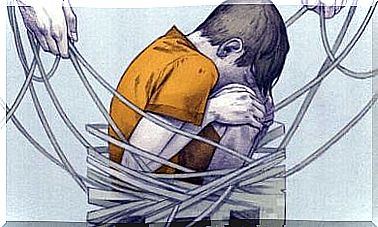The Experience Of Grief

Overcoming grief takes time and a lot of personal effort.
The biography of each one of us is full of a succession of losses and separations, which remind us of the temporality of any bond or relationship and of all reality, whether consciously or unconsciously.
Grief is the psychological reaction that appears to a loss; the emotional pain of having lost something or someone significant in our lives. This psychological reaction has not only emotional but also physiological and social components.
When we talk about grief on a daily basis, we most often associate it with death, but this process can also be seen in the face of the rupture of a relationship, the loss of a job or the loss of a relational object with which we had a strong bond. Therefore, the grieving process means that, due to the loss, we must adapt to a new life without that person or thing, and its development goes through the reconstruction of meanings.
Normally, grief resolves itself naturally when we understand that it is a normal process limited in time, advancing its evolution towards overcoming it, which can strengthen our maturity and personal growth. But just as it is recognized that it is a “natural” process that entails great suffering for most people, it is also known that this process can be complicated with others, even producing disorders if the symptoms persist over time and affect the development of daily life, and some people are stuck at some stage, without letting go or saying goodbye to what they have lost.
It is difficult to say when the mourning really ended, even though it is considered a key moment when the person is able to look back, that is, to their past and remember with calm and peaceful affection, with longing but without pain , of the person who is gone and of their shared history.
Usually the elaboration of this entire process takes between one and two years, depending on each person, the proximity and the quality of the bond that existed.
Elaborate grief
The elaboration of grief goes through different stages, in which very painful emotions may predominate. These stages are not understood as fixed and organized periods, on the contrary, they tend to overlap, containing a mixture of emotions and responses.
Worden describes the tasks that the person should carry out in mourning, as a therapeutic basis for the entire process:
1) Accept reality.
2) Experiencing pain.
3) Adapt to a world in which the missing person is absent.
4) Reposition the deceased emotionally and look to the future.
What can we do to process grief?
– Accept and understand that grief is a natural process that takes time, without trying to rush it. To be able to face the loss and go through it in a way
– Not resisting change. A transformation takes place in the face of the loss of people and roles that occupy a central place in our lives. It is best to embrace these changes, taking advantage of the opportunities that present themselves for growth, while acknowledging the aspects in which we feel impoverished.
– Express our emotions and feelings. Communicate them, do not repress them and, if necessary, seek help from a professional.
– Being surrounded by life, activating our social relationships, learning something new or doing physical activity, for example, according to our age and health condition.
– Search for new meanings for life, create and develop projects.
When to look for help?
The pain, suffering and disorders that accompany grief are not “abnormal”, but there are certain symptoms that indicate that we should consult a professional, even if the final decision is up to each one.
Second, Robert A. Neimeyer, you should seriously consider talking to someone about your grief if you have any of the following symptoms:
– Intense feelings of guilt.
– Thoughts of suicide.
– Exacerbated despair.
– Restlessness or prolonged depression.
– Physical symptoms (substantial weight loss, feeling of having a knife in the chest, etc.)
– Uncontrolled anger.
– Continuous difficulties in operation.
– Substance abuse
Although any one of these symptoms can be characteristic of a normal grieving process, its continuation for a long time should be a reason for concern and attention to consult a professional.
The elaboration of mourning means putting yourself in contact with the emptiness left by the loss of what no longer exists, valuing its importance and enduring the suffering and frustration that its absence entails . (Jorge Bucay)
Image courtesy of Emerald Wake









